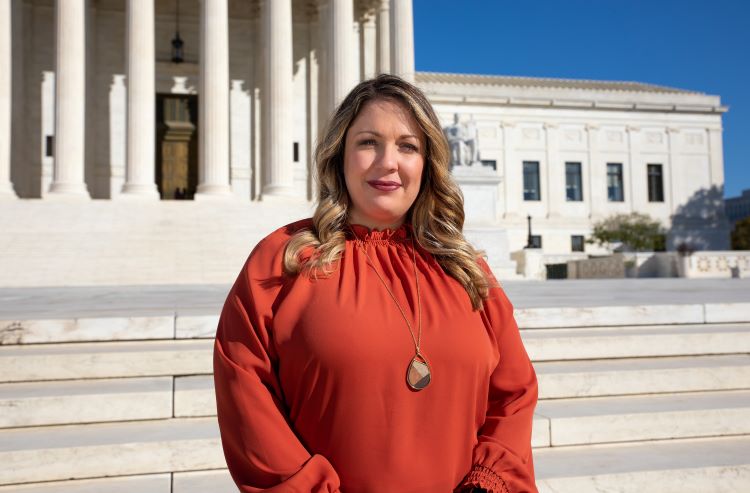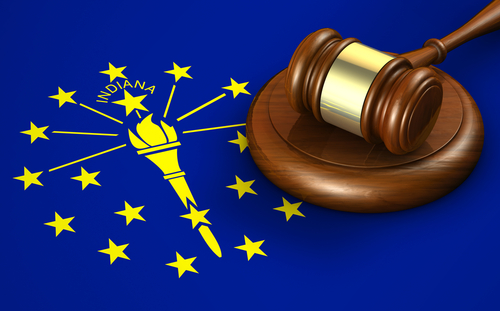Supreme Court rules for Christian businesswoman who won't make websites for same-sex weddings

Christian businesswoman and graphic designer Lorie Smith previously told the ABA Journal that she wants to design and create websites for weddings in a way that is consistent with her convictions. Image from Shutterstock.
The U.S. Supreme Court ruled Friday that the First Amendment protects a web designer who refuses to create websites for same-sex weddings.
The Supreme Court ruled 6-3 for Lorie Smith and her company, 303 Creative, in an opinion written by Justice Neil Gorsuch. The high court’s three liberal justices dissented.
Smith has a religious belief that marriage is only between a man and a woman, and she will not design websites for same-sex weddings. The Colorado law, however, bars discrimination based on sexual orientation.
Smith doesn’t currently design wedding websites, but she plans to expand her business to do so.
Gorsuch said Smith can’t be forced to speak in ways that align with Colorado’s views while defying her conscience on a matter of major significance.
Gorsuch’s decision stands in contrast to a June 2020 decision that favored the LGBTQ community. That decision held that the ban on sex discrimination in Title VII of the Civil Rights Act protects gay and transgender workers.
In Smith’s case, Gorsuch acknowledged that public accommodation laws play a vital role in protecting the civil rights of Americans. Over time, states have extended such laws to cover more forms of discrimination. Currently, about half the states have laws banning discrimination on the basis of sexual orientation.
But “public accommodations statutes can sweep too broadly when deployed to compel speech,” Gorsuch said. “When a state public accommodations law and the Constitution collide, there can be no question which must prevail.”
Justice Sonia Sotomayor dissented in an opinion joined by Justices Elena Kagan and Ketanji Brown Jackson.
“Today, the court, for the first time in its history, grants a business open to the public a constitutional right to refuse to serve members of a protected class,” Sotomayor wrote.
The decision is “profoundly wrong,” she said.
“The law in question targets conduct, not speech, for regulation, and the act of discrimination has never constituted protected expression under the First Amendment,” Sotomayor said.
Smith previously told the ABA Journal that she wants to design and create websites for weddings in a way that is consistent with her convictions.
“While I work with everyone, I cannot create every message that is requested of me,” Smith told the ABA Journal. “Colorado … tells me that If I create consistent with my deeply held beliefs, I have to set those aside and create custom unique artwork, one-of-a-kind expression, promoting a message of marriage that goes against my deeply held beliefs.”
The Supreme Court agreed only to decide whether the Colorado law violates the First Amendment’s free speech clause. It did not consider free exercise issues.
A document in the case is getting scrutiny as a result of reporting by the New Republic, followed by a story in the Guardian.
According to the stories, Smith received a 2016 email seeking design help from a couple named Stewart and Mike. The couple said they wanted design work for wedding invitations that might “also stretch to a website.”
When a reporter from the New Republic called Stewart, he said he never sent the inquiry. The website inquiry form had his real name, phone number, email address and website. But “I’m married, I have a child” and have no need of wedding design services, he said.
“I’m not really sure where that came from? But somebody’s using false information in a Supreme Court filing document,” he said.
 Lorie Smith, owner and founder of 303 Creative, at the U.S. Supreme Court in Washington, D.C. Photo from Alliance Defending Freedom.
Lorie Smith, owner and founder of 303 Creative, at the U.S. Supreme Court in Washington, D.C. Photo from Alliance Defending Freedom.
The 303 Creative case follows the Supreme Court’s 2018 decision in Masterpiece Cakeshop Ltd. v. Colorado Civil Rights Commission. In that case, the Supreme Court ruled that Colorado’s Civil Rights Commission violated the free exercise rights of a Christian baker by showing hostility to his explained religious reasons for refusing to bake a cake for a same-sex wedding.
Masterpiece Cakeshop left unresolved whether sincerely held religious beliefs can trump anti-discrimination laws.
Smith and the Colorado baker were represented by the conservative Christian nonprofit group Alliance Defending Freedom.
ABA President Deborah Enix-Ross issued this statement on the decision: “Following today’s Supreme Court decision in Creative 303 v Elenis, the American Bar Association calls on Congress to pass the Equality Act which will better safeguard the rights of LGBTQ+ people.
“The ABA recognizes the rights of individuals who are lesbian, gay, bisexual or transgender as basic human rights. The ABA supports laws, regulations, rules and practices that support equality for LGBTQ+ people.
“It can be challenging to balance First Amendment rights such as freedom of speech or religion against anti-discrimination laws. But laws protecting against LGBTQ+ discrimination are as important as laws protecting against other forms of discrimination.”
The ABA had urged the Supreme Court to reject the web designer’s First Amendment argument.
“If, as Coloradans clearly intend, gay and lesbian people are to be equal citizens and not ‘social outcasts’ … it is imperative that this court reject petitioners’ request for a constitutional exemption, just as it did a half-century ago, when business owners sought similar exemptions from laws prohibiting race discrimination,” the ABA said in its amicus brief.
The case is 303 Creative v. Elenis.
Hat tip to SCOTUSblog for its early reporting on the decision.
See also:
ABAJournal.com: “Chemerinsky: Supreme Court reflects nation’s deep divide over Constitution and religion”
ABAJournal.com: “Chemerinsky: Expect momentous decisions from the Supreme Court as term ends”
ABAJournal.com: “Chemerinsky: An important week of arguments in the Supreme Court”
ABAJournal.com: “Supreme Court majority seems ready to rule for web designer who won’t make websites for same-sex weddings”



